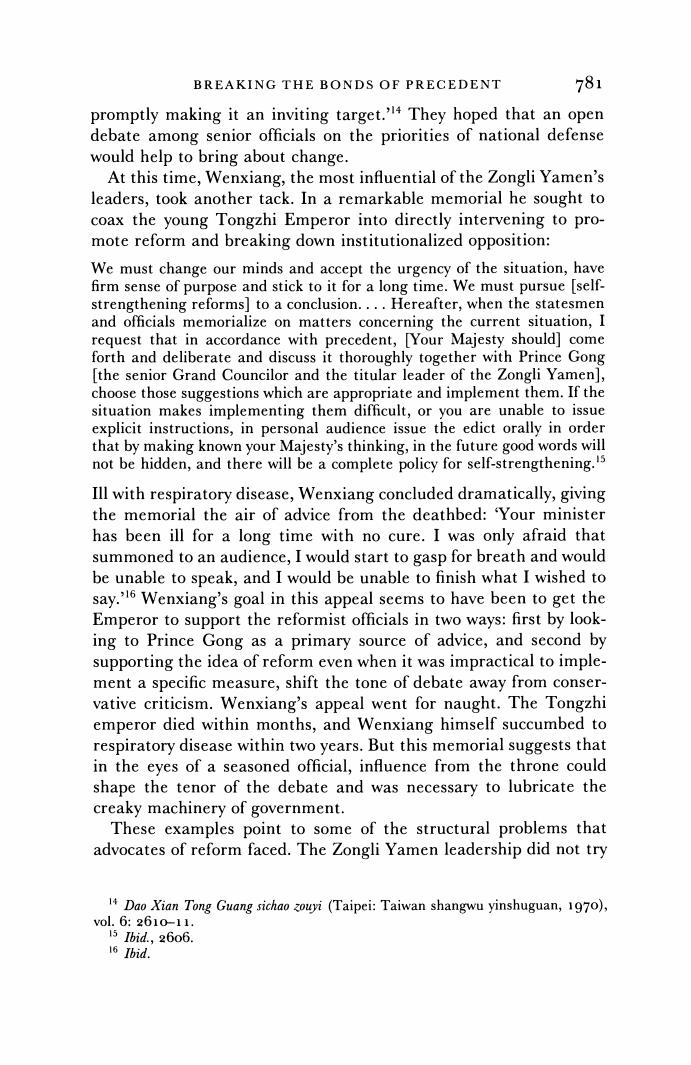正在加载图片...

BREAKING THE BONDS OF PRECEDENT 781 promptly making it an inviting target.'4 They hoped that an open debate among senior officials on the priorities of national defense would help to bring about change. At this time,Wenxiang,the most influential of the Zongli Yamen's leaders,took another tack.In a remarkable memorial he sought to coax the young Tongzhi Emperor into directly intervening to pro- mote reform and breaking down institutionalized opposition: We must change our minds and accept the urgency of the situation,have firm sense of purpose and stick to it for a long time.We must pursue [self- strengthening reforms]to a conclusion....Hereafter,when the statesmen and officials memorialize on matters concerning the current situation,I request that in accordance with precedent,[Your Majesty should]come forth and deliberate and discuss it thoroughly together with Prince Gong [the senior Grand Councilor and the titular leader of the Zongli Yamen], choose those suggestions which are appropriate and implement them.If the situation makes implementing them difficult,or you are unable to issue explicit instructions,in personal audience issue the edict orally in order that by making known your Majesty's thinking,in the future good words will not be hidden,and there will be a complete policy for self-strengthening.5 Ill with respiratory disease,Wenxiang concluded dramatically,giving the memorial the air of advice from the deathbed:'Your minister has been ill for a long time with no cure.I was only afraid that summoned to an audience,I would start to gasp for breath and would be unable to speak,and I would be unable to finish what I wished to say.'16 Wenxiang's goal in this appeal seems to have been to get the Emperor to support the reformist officials in two ways:first by look- ing to Prince Gong as a primary source of advice,and second by supporting the idea of reform even when it was impractical to imple- ment a specific measure,shift the tone of debate away from conser- vative criticism.Wenxiang's appeal went for naught.The Tongzhi emperor died within months,and Wenxiang himself succumbed to respiratory disease within two years.But this memorial suggests that in the eyes of a seasoned official,infuence from the throne could shape the tenor of the debate and was necessary to lubricate the creaky machinery of government. These examples point to some of the structural problems that advocates of reform faced.The Zongli Yamen leadership did not try Dao Xian Tong Guang sichao zouyi (Taipei:Taiwan shangwu yinshuguan,1970), vol.6:2610-11. 15Ibid.,26o6. 16 Ibid.BREAKING THE BONDS OF PRECEDENT 781 promptly making it an inviting target.'14 They hoped that an open debate among senior officials on the priorities of national defense would help to bring about change. At this time, Wenxiang, the most influential of the Zongli Yamen's leaders, took another tack. In a remarkable memorial he sought to coax the young Tongzhi Emperor into directly intervening to promote reform and breaking down institutionalized opposition: We must change our minds and accept the urgency of the situation, have firm sense of purpose and stick to it for a long time. We must pursue [selfstrengthening reforms] to a conclusion.... Hereafter, when the statesmen and officials memorialize on matters concerning the current situation, I request that in accordance with precedent, [Your Majesty should] come forth and deliberate and discuss it thoroughly together with Prince Gong [the senior Grand Councilor and the titular leader of the Zongli Yamen], choose those suggestions which are appropriate and implement them. If the situation makes implementing them difficult, or you are unable to issue explicit instructions, in personal audience issue the edict orally in order that by making known your Majesty's thinking, in the future good words will not be hidden, and there will be a complete policy for self-strengthening.'5 Ill with respiratory disease, Wenxiang concluded dramatically, giving the memorial the air of advice from the deathbed: 'Your minister has been ill for a long time with no cure. I was only afraid that summoned to an audience, I would start to gasp for breath and would be unable to speak, and I would be unable to finish what I wished to say."' Wenxiang's goal in this appeal seems to have been to get the Emperor to support the reformist officials in two ways: first by looking to Prince Gong as a primary source of advice, and second by supporting the idea of reform even when it was impractical to implement a specific measure, shift the tone of debate away from conservative criticism. Wenxiang's appeal went for naught. The Tongzhi emperor died within months, and Wenxiang himself succumbed to respiratory disease within two years. But this memorial suggests that in the eyes of a seasoned official, influence from the throne could shape the tenor of the debate and was necessary to lubricate the creaky machinery of government. These examples point to some of the structural problems that advocates of reform faced. The Zongli Yamen leadership did not try 14 Dao Xian Tong Guang sichao zouyi (Taipei: Taiwan shangwu yinshuguan, 1970), vol. 6: 2610-11. '1 Ibid., 266. '6 Ibid